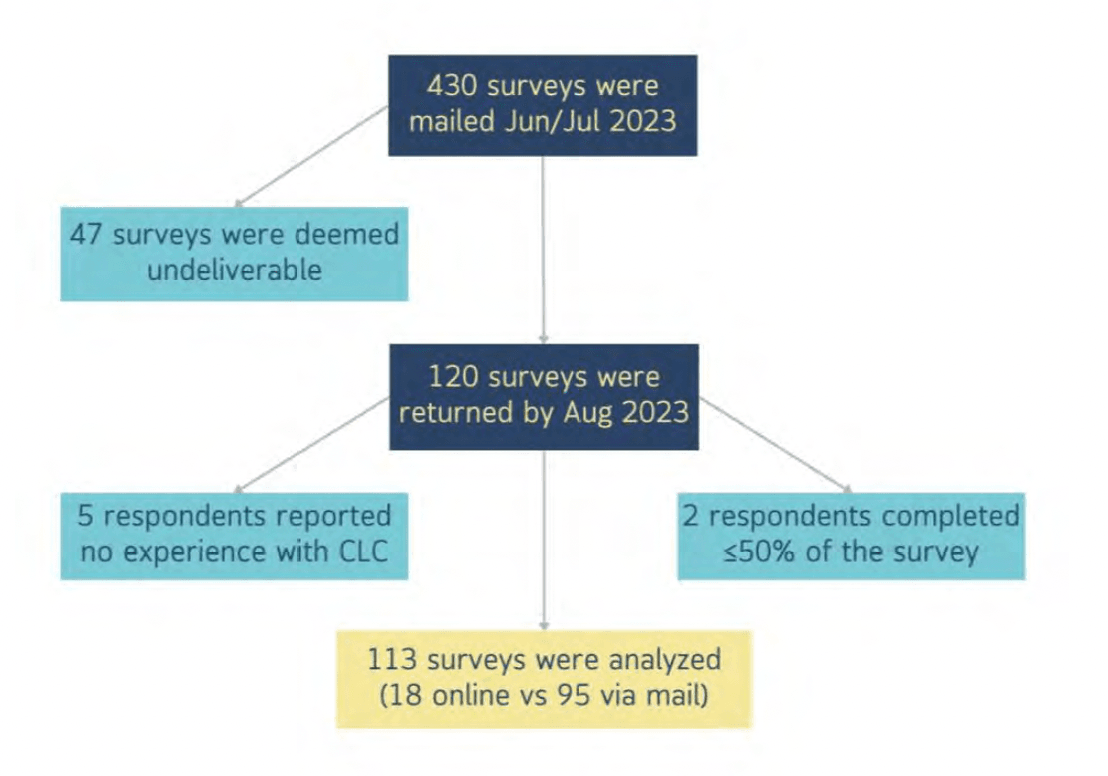
Cancer Legal Care was fortunate to receive funding in 2023 from the Shavlik Family Foundation to work with our clients and Helen Parsons, PhD, MPH and her team at the University of Minnesota, to conduct a comprehensive client survey as we plan for the years ahead.
Specifically, we were eager to learn:
- what was and wasn't working with our process of providing legal services,
- how effective our services are at answering their questions and helping to resolve their legal issues,
- barriers they faced in accessing legal services,
- their experience with cancer's financial toxicity,
- and their confidence in applying for Social Security disability benefits.
The survey was designed based on key themes identified by CLC client interviews. The survey was then mailed USPS to 430 recent CLC clients with the option of answering the survey online (link provided) or via the paper copy with return postage provided. 120 surveys were returned with 113 (26%) being included in analysis (five survey respondents did not recall using CLC services and two were incomplete). The full survey design and details can be found on our website here.
Some highlights:
- 75% of respondents indicated a preference to contact CLC by phone and 41% by video conference. This compares to 38% in CLC's offices or 30% in their cancer clinic.
- When asked about how they would like to find out about CLC's services, 81% indicated their medical team and 50% indicated their oncologist specifically; compared to 66% and 11%, respectively, as to the actual way they learned about CLC.
- When asked about when would be the best time to be referred to CLC, 66% indicated at diagnosis, and 35% at the start of treatment.
- 93% of respondents indicated that CLC was able to resolve all (70%) or most (23%) of their legal concerns.
- The top three reasons for hesitancy or barriers in contacting CLC were
- Feeling overwhelmed by other responsibilities (57%)
- Worried about what the lawyer might say (38%)
- Concerns about cost (33%)
- 78% of respondents indicated that cancer had a profound (44%) to moderate (34%) impact on their finances.
- 40% responded that they would not feel comfortable applying for Social Security disability benefits without professional help.
* note clients could identify more than one answer in these questions.
And some thoughts from our clients:
"Again, you will never know how much peace of mind having this done has given me. I did feel guilty not paying for it, but if it hadn't been gifted to me I couldn't have afforded to have it done. You are providing a huge service and safety net for those of us who are fighting this terrible disease."
"Terminal cancer is beyond terrifying. Having to worry about finances above and beyond a terminal diagnosis is cruel and unfair. Cancer Legal Care helped me plan and prepare regarding my disability options, so things feel much less precarious."
"I have no income since I was diagnosed. I exhausted all my savings, and my children are supporting me until I can get back to work."
"Cancer's impact on my life along with my household income has been devastating."
All of these findings are incredibly helpful as we continue to evolve and grow our programming, especially in light of the many changes the pandemic brought to lives and relationships. A few examples of how the survey is already informing our work:
- In Spring 2024, we will be partnering with gastro-oncologists at the University of Minnesota for a small pilot project to test the introduction of a proactive "Legal Care Checkup" shortly after diagnosis. This study was designed with the survey findings top of mind ("earlier referrals to CLC are better" and the strong preference to have the oncology/medical team making these referrals).
- Our new Social Security Application Assistance Program that launched in January 2023 will be implementing many of the narrative suggestions provided at the end of the survey for reducing barriers to accessing the program.
- We have always connected with the vast majority of our clients over the phone. Finding such a strong preference for digital meetings (78% phone, 41% video conference) helps us plan financially for needed technology and office space needs, and how we plan with our referring medical providers to work best with their clients and staff.
A very big thank you to our clients who so generously shared their thoughts and participated in the survey and interviews. We are grateful.
More updates to come in 2024!
